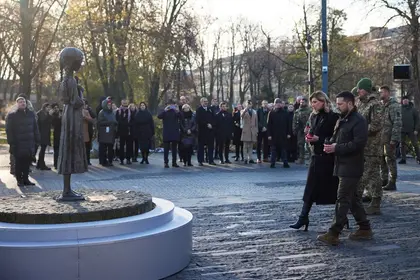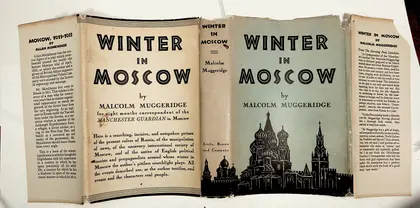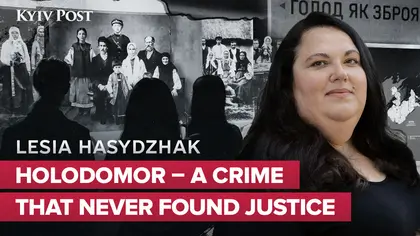A distinguishing feature of the society whose workings led to the mind-numbing rapaciousness that resulted in the Holodomor famine was its conviction that history is driven by immutable iron laws. Marx’s writings are infused with the notion that human history, like physics, is driven by unassailable rules that determine the next steps along the path to progress.
Marx, and others like him, most notably his intellectual collaborator Engels, saw in the optimistic Victorian progress and positive developments of science a chance to use rational planning and thought to overcome the depravities of working-class England. It seemed as if the scourge of poverty and the brutal conditions enforced by the ruling class might finally give way to a better future under the pressure of inescapable currents, which we could, with enough intellectual effort, describe.
JOIN US ON TELEGRAM
Follow our coverage of the war on the @Kyivpost_official.
The Marxist dream was compelling precisely because it seemed scientific. In all the messiness of human relationships, and millennia of disasters, what’s not to like about a creed which suggests that we could get control of everything – direct it to a purpose – and, by discovering the underlying laws, which like the laws of gravitation would allow for concrete predictions, grasp our utopian dreams that have so eluded us. It’s intoxicating stuff.
The problem with this enthusiasm for scientific planning became apparent almost immediately after it was first implemented on a grand scale in the Soviet Union. Any social plan that claims to be carried forward by a preordained order – historical materialism, as it was enticingly named – can never accept dissent or failure.

Holodomor in Perspective 90 Years On
Once a political and economic edifice has been erected on the promise of a utopia tomorrow in exchange for the abnegation of personal freedom today, it is of immense danger to admit that the entire thing may be wrong. And thus, from this toxic recipe emerges a maniacal need to keep the train on the tracks.
The inability to accept failure, especially of the agricultural innovations and ideas of Soviet science, led to the need to lie to the world about Soviet agricultural success. As agriculture is, of course, fundamental to human welfare, the success of the entire Marxist experiment became contingent on the perceived success or failure of the system it put in place to supply enough food.
As it began to unravel, drastic measures were required to maintain the illusion that agricultural productivity was living up to socialist promises. All sacrifices were deemed acceptable to maintain the façade of this scientific approach and from there sprung the horrors of enforced quotas, cover-ups, repression, and ultimately genocide.
The sheer scale of the disaster is difficult to absorb. Anyone unfamiliar with this period of human history should visit the museum in Kyiv and peruse the books of its victims. Page after page after page of entire villages starved from the face of the Earth.
Aside from the dictates of the Party, the mechanics of the Holodomor developed its own momentum. Those who wanted to survive had to do the bidding of the Party and those who saw opportunity for personal advance were happy to implement the plan. Like the Nazi death camps, a system of mass murder develops its own internal logic until, ironically, the so-called scientific planning gives way to a maelstrom of irrational cruelty and madness from which it is difficult, or impossible, for any individual to exert sufficient strength to stop the plan until there is no further material to feed the killing machine.
In the face of such horrors, it would be easy enough to draw the conclusion that science had gone too far. The Holodomor would seem to be the ultimate proof of the terrible error of taking science beyond its limits, in applying cold scientific reasoning to the planning of human affairs at a scale quite inappropriate to its real power and accuracy.
In terms of the failure of central planning, I think there can be little doubt that the Marxist socialist society, and the terrors that it brought to fruition, are indeed a compelling argument against all-encompassing governments and the handing of omniscient power to individuals to carry through draconian plans.
Yet in the case of science, surprisingly one might draw completely the opposite conclusion. Contrary to the claims of the Marxists to be scientific and to dress their intentions in the garb of ‘scientific socialism’, and despite its apparent commitment to science and technology, the Soviet Union was a deeply anti-scientific endeavor, as is the Marxist creed in general.
Science is not dogmatic. Although it seeks to identify and refine our understanding of the laws through which the universe functions, the process of advancing our comprehension of those rules is one of intense humility. We never claim to know what those laws are in finality. The scientific method encourages those who have countervailing ideas about how everything works to come forward and challenge the existing paradigms (I accept that people being what they are, this isn’t always perfect – they have pride and jobs to protect!). However, despite its imperfections, science has been remarkably successful at culturing and allowing dissent.
Science is anti-authoritarian by its nature. It only works when independence of mind is encouraged in its practitioners, because it is only through such a state of mind that new ideas and solutions can be encouraged to emerge and ultimately to be tested.
Perhaps one of science’s supreme characteristics is the ability to change course. When an experiment doesn’t work, we don’t doggedly continue with it, ignoring all evidence, until we destroy everything we have created. Instead, we stand back, question our assumptions, and try something new.
Everything I have just described about science is quite antithetical to the way in which a socialist or communist state operates. It claims to follow scientific ideas and to plan society along rational lines, but in its frequent incapacity to accept its own failure or to challenge its fundamental assumptions, it deviates from every tenet of science.
If Ukrainian agriculture from the 1920s to the 1940s had been run by people who truly believed in the methods of science, then at the slightest sign of starvation, questions would have been asked about why the experiment was failing. Is there perhaps a better way to run agriculture? Perhaps our crop experiments are in error, and we must try a different approach? Maybe the assumptions of the entire plan are wrong, and we must revisit our theory in its totality? These would have been the questions of a humane scientific society. But they were not, and the result was the Holodomor.
Can we ever get this right and build a society that is managed along the true contours of science? The answer is broadly yes, and that type of society is a liberal democracy. In many ways, liberal democracies come closest to the scientific ethos.
In such societies, failures can be corrected by changing the government. New ideas can be sought by encouraging dissent and political opposition.
The success of agriculture and all other facets of society can be constantly checked and assessed by freedom of the press, assembly and speech, mechanisms that allow the human social experiment to be evaluated and redirected. Economic freedom allows individuals and corporations to compete to find the best ways to meet human material demands and to try new experiments in matching those needs efficiently, including in food production.
Liberal democracies are scientific to the extent that they are messy, largely unplanned, they work iteratively towards an improvement in the human condition without unrealistic promises of a utopian end-point, and they are not beholden to doctrinaire unyielding ideology, instead relying on experimentation, testing, and free discussion. This may explain why scientific thought itself seems to thrive most successfully within them.
If we want to learn the lessons of the Holodomor, one of them may be that we should turn our backs on centrally planned societies, but counter-intuitively we should not allow the disaster of Marxism to sour our view of science. We need societies that behave more like scientists and not less.
It is only by embracing the humility of our incomplete knowledge yet being appreciative and confident of our intellectual capacities to think up new ideas and change course, that we have a chance to build better societies. This, to me, is an enduring message of the Holodomor.
Charles Cockell is Professor of Astrobiology at the University of Edinburgh.
The views expressed in this opinion article are the author’s and not necessarily those of Kyiv Post.
You can also highlight the text and press Ctrl + Enter






